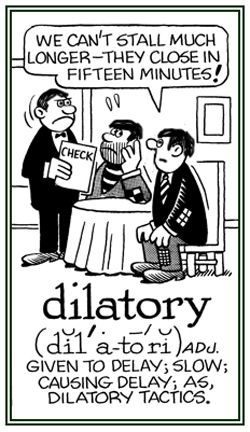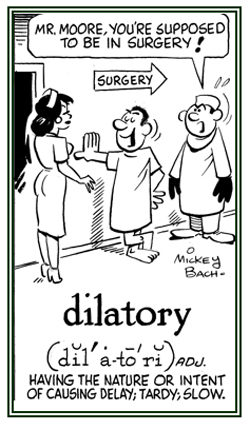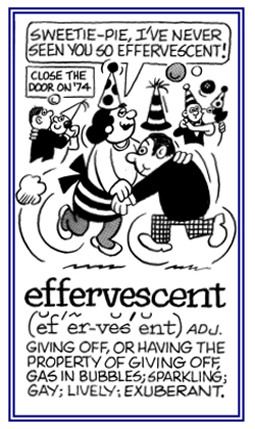differentiation
(s) (noun), differentiations
(pl)
Becoming transformed in the course of development which is not the same as others: There are
differentiations in the complexities and organizations of cells, tissues, and body organs as they become progressively more specialized in their formations and functions; especially during the embryonic or pre-birth growth.
The differentiation between the pupae and the larva of a butterfly is easy to determine.
By studying his twin sons carefully, Sandy, their father, noticed some differentiations that helped him to distinguish one boy from the other one.
differently
(adverb), more differently, most differently
In a manner that is exceptional, unusual, or not typical: After Kitty read the case histories of her clients, she thought differently about how to manage the legal procedures.
diffidence
(s) (noun) (no plural)
Distrust of oneself; lacking trust in one’s own ability, worth, or fitness; having a modest or shy disposition: Marcus has an abnormal
diffidence or is very timid when he is around girls, especially Harriet.
A diffident man is one who has finally discovered that there are some problems for which no one has a solution. It seems that when a person thinks he knows all the solutions to a problem, some fool comes along and asks the wrong questions.
—John Rayoa
 © ALL rights are reserved.
© ALL rights are reserved.
Go to this Word A Day Revisited Index
so you can see more of Mickey Bach's cartoons.
diffident
(adjective), more diffident, most diffident
1. Pertaining to a lack of confidence or not feeling comfortable around certain people: When Jason is called on to answer a question that Mrs. Savage, the teacher, is asking him during class, he usually has a
diffident way of expressing himself even when he is certain that he is correct.
2. A reference to being very careful about acting or speaking: As Mrs. Hoover, the reporter, asked the politician, Mrs. Traviss, if she would be running for a third term, she made a
diffident response because she didn't want to say anything that could be interpreted as being slanderous about her opponent.
 © ALL rights are reserved.
© ALL rights are reserved.
 © ALL rights are reserved.
© ALL rights are reserved.
 © ALL rights are reserved.
© ALL rights are reserved.
Go to this Word A Day Revisited Index
so you can see more of Mickey Bach's cartoons.
diffidently
(adverb), more diffidently, most diffidently
A reference to having distrust in one's self: Henry diffidently asked Rena, his neighbor, about her family problems because he didn't want her to think he was prying into her personal affairs.
dilatoriness
(s) (noun) (no plural)
1. The quality of being late; slowness in motion and getting things accomplished; delay in proceeding; tardiness: Alex's dilatoriness in getting ready to go shopping for his school supplies was upsetting his mother.
2. Etymology; from Late Latin dilatorius; from dilator, "procrastinator"; from dilatus; as the past participle of Latin differe, "to delay, to carry apart, to scatter, to disperse."
dilatory
(adjective), more dilatory, most dilatory
1. A reference to an inclination or intention to waste time, to cause a delay, or to lag behind: Because of the auto accident on the street, it took Monroe a great deal of
dilatory time to get home after work.
2. Using cautious slow strategy to wear down the opposition; and so, avoiding direct confrontation and deferring a decision: The congressman, Mr. Gould, used a
dilatory strategy to keep the bill from being passed.
3. Etymology: from Latin
dilatorius; from
dilator, "procrastinator", from
dilatus, the past participle form of
differe, "to delay".
 © ALL rights are reserved.
© ALL rights are reserved.
 © ALL rights are reserved.
© ALL rights are reserved.
Go to this Word A Day Revisited Index
so you can see more of Mickey Bach's cartoons.
efferent
(adjective), more efferent, most efferent
A reference to moving away: An artery is an efferent vessel carrying blood away from the heart while an efferent nerve carries impulses away from the central nervous system.
effervescent
(adjective), more effervescent, most effervescent
A description of a lively or exciting quality of behavior: Rachel's
effervescent personality was charming and very attractive while she was greeting the guests as they came to attend her sister's wedding.
 © ALL rights are reserved.
© ALL rights are reserved.
Go to this Word A Day Revisited Index
so you can see more of Mickey Bach's cartoons.
ferriferous
(adjective), more ferriferous, most ferriferous
Characteristic of rocks that contain iron: Among other miners, Leo and Harold were digging to collect
ferriferous ores or quartz which could be used to smelt into steel.
The geologists from the university, William and Carl, identified ferriferous rocks and wrote their report which was given to a mining company.
fertile
(adjective), more fertile, most fertile
1. Pertaining to being productive and capable of nurturing development: Her
fertile imagination helped Madam "Z" write her fantasy novels which were very popular.
After the floods which deposited new soil and nutrients, the fertile soil produced a bumper crop of tomatoes for the Bell family.
2. Etymology: from Middle French (1400 to about 1600)
fertil and directly from Latin
fertilis, "bearing in abundance, fruitful, productive"; from Latin
ferre, "to bear, to carry".
fertilely
(adverb), more fertilely, most fertilely
In a manner that is capable of producing offspring, or of producing agricultural crops, or solutions of problems: In his fertilely active imagination, Detective Potter was always able to solve mysteries which seemingly puzzled the other investigating police officers.
fertility
(s) (noun), fertilities
(pl)
1. A situation in which quantities of young offspring result: As a biologist, Lisa was assigned to determine the effects of pollution on the fertility of the fish in the state of Washington.
2. The capability of supporting the growth of agricultural plants: The drought in California has resulted in a severe decrease in the fertility of the land for citrus fruit, grapes for wine, and many other plants for human and animal consumption.
fertility
(adjective), more fertility, most fertility
1. A reference to the existence of animal species and plants: Generally, the
fertility lives of animals and plants in arid regions is not as plentiful as in wetter areas.
Is it possible that there are more fertility results among animals when they are not harassed by hunters?
2. The capability of a plant, animal, or the mind to produce something; such as, an idea or to reproduce its kind: The emergence of the new art that blends traditional art and science proved to be the
fertility concepts inspired by new discoveries in science.
Many cultures have chosen to judge the worth of its women by their fertility conditions and their ability to produce children.
fertility cult
(s) (noun), fertility cults
(pl)
A form of religion that has ceremonies which are intended to maintain the reproductions of the people and the agriculture of a community: Abraham and his wife, Sara, were members of a fertility cult because they wanted to guarantee the future well-being of the people in their group, have more children, and, at the same time, provide good harvests of nourishing food for everyone.
Cross references of word families related to "bear, carry, bring":
duc-;
ger-;
later-, -lation;
phoro-;
port-.









